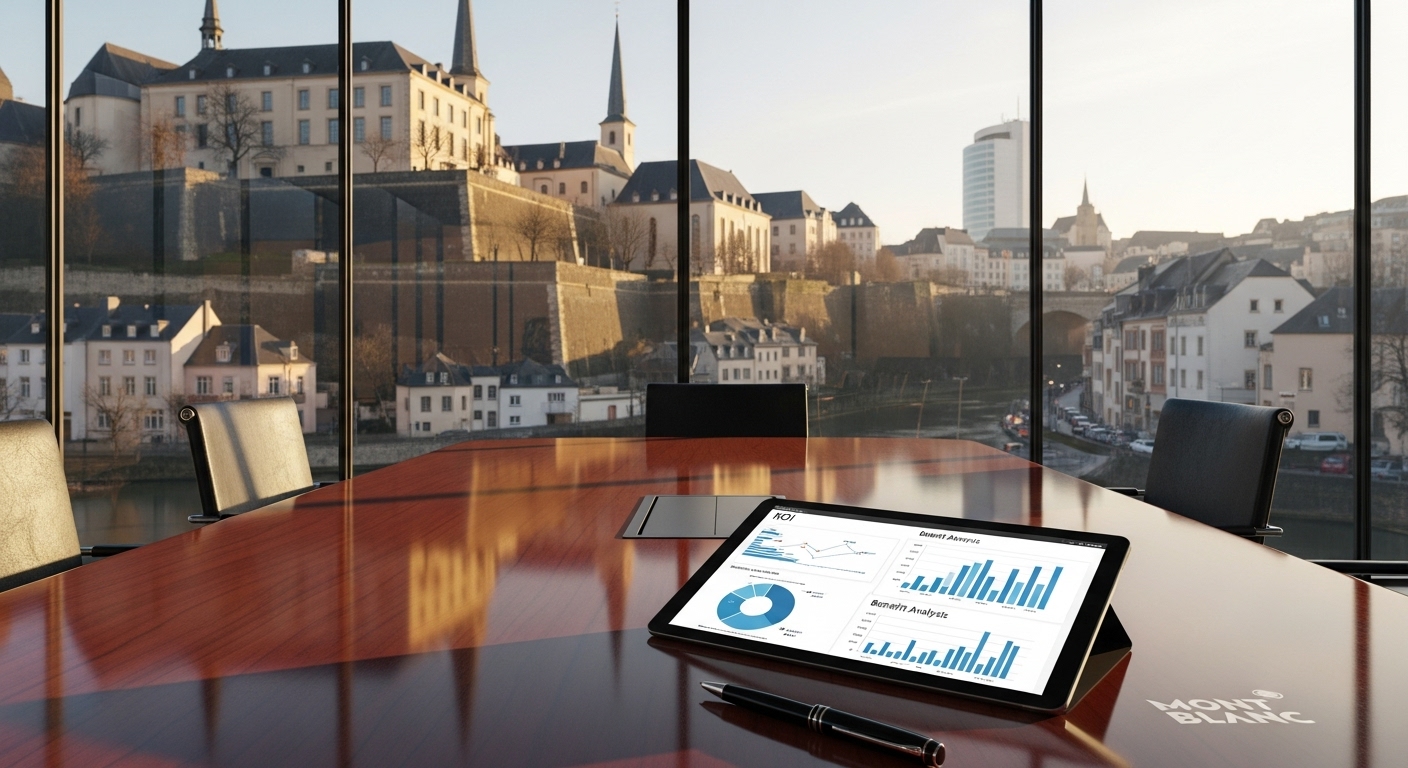In the heart of Europe, Luxembourg stands as a beacon of economic stability and financial prowess. For businesses aiming to establish or expand their footprint, it presents a compelling yet complex proposition: immense opportunity paired with significant operational costs. Navigating this high-stakes environment requires more than just intuition; it demands a rigorous, data-driven approach. This is where a comprehensive Cost-Benefit Analysis (CBA) becomes not just a useful tool, but an essential strategic compass. It allows leaders to look beyond the surface-level expenses and uncover the long-term value—the ‘Grand Duchy Dividend’—that strategic investments can yield. This guide will provide a practical framework for applying CBA to key operational decisions, from talent acquisition to technological adoption, ensuring every choice is calibrated for maximum return in this unique and dynamic market.
The Pillars of Cost-Benefit Analysis in a Premium Market
At its core, Cost-Benefit Analysis (CBA) is a systematic process for calculating and comparing the benefits and costs of a project, decision, or policy. However, in a premium market like Luxembourg’s, a simple tally of monetary figures falls short. A robust CBA must account for a wide spectrum of factors, both tangible and intangible. Tangible costs are straightforward: rent for prime office space, competitive salaries for a skilled workforce, and technology procurement. Tangible benefits are equally clear, such as increased revenue, higher productivity, or reduced operational waste. The real challenge, and where strategic insight is crucial, lies in evaluating the intangibles. Intangible costs might include the temporary disruption of implementing a new system or the potential for employee resistance to change. Conversely, intangible benefits are often the most powerful drivers of long-term success. These can include enhanced brand reputation from a prestigious address, improved employee morale leading to higher retention, or the strategic advantage gained from being at the center of European policymaking and finance. A successful CBA framework gives appropriate weight to these non-monetary factors, often by using proxy metrics or qualitative scoring, to paint a complete picture of a decision’s true impact on the business.
Quantifying the Costs: A Realistic Look at Operating in Luxembourg
Before reaping the benefits of a Luxembourg base, businesses must have a clear-eyed view of the associated costs. The Grand Duchy’s high standard of living and competitive landscape translate directly into significant operational expenditures. Human capital is the largest and most critical investment. Attracting and retaining top-tier, multilingual talent in fields like finance, law, and technology requires offering salary and benefits packages that are among the highest in Europe. Another major line item is real estate. Securing a modern, well-connected office space in business districts like Kirchberg or Cloche d’Or comes at a premium. Beyond these, businesses operating in Luxembourg City must budget for robust IT infrastructure, cybersecurity measures compliant with EU standards like GDPR, and professional services for legal and tax advisory. Regulatory compliance, particularly within the financial sector, is non-negotiable and requires ongoing investment in expertise and technology. While these costs may seem daunting, quantifying them accurately is the first step in a sound CBA. It establishes a clear baseline from which to measure the immense potential returns and strategic advantages that the location offers.
Uncovering the Benefits: The Strategic Value of a Luxembourg Footprint
The ‘benefit’ side of the ledger is where Luxembourg truly distinguishes itself. The advantages extend far beyond a simple P&L statement, offering profound strategic value. The most significant benefit is unparalleled access to the European Union’s single market. As a founding member of the EU, Luxembourg provides a stable and reputable gateway to over 450 million consumers. This political and economic stability is a powerful asset in an often-volatile global landscape. Furthermore, the nation’s business-friendly environment, supported by a responsive government and a favorable (though compliant) corporate tax framework, creates a fertile ground for growth. The concentration of global financial institutions, investment funds, and EU bodies like the European Court of Justice and the European Investment Bank creates an ecosystem rich with opportunity for partnership, client acquisition, and access to capital. This density of expertise also fosters a world-class talent pool, fluent in multiple languages and highly educated, which is a critical enabler for any international business. These benefits—market access, stability, a rich ecosystem, and elite talent—are the powerful counterweights to the high operational costs, and for many, they tip the scales decisively in favor of investment.
The Talent Equation: Analyzing Investment in Human Capital
One of the most frequent and critical decisions a company faces is how to structure its team. In Luxembourg, this decision is amplified. The cost of hiring a full-time, locally-based employee is substantial, encompassing not just salary but also social security contributions and other benefits. A CBA for talent involves weighing this high direct cost against the profound benefits of local expertise. An employee based in Luxembourg City brings an innate understanding of the local market, established professional networks, and the ability to engage in face-to-face interactions that are often crucial for high-value B2B relationships. Their presence facilitates quicker navigation of administrative and regulatory hurdles. The alternative—hiring remotely or outsourcing—presents lower direct costs. However, the intangible costs can be significant, including communication challenges across time zones, a potential disconnect from the local business culture, and missed opportunities for spontaneous collaboration and networking. A thorough analysis might reveal that for core strategic roles, the premium paid for local talent generates a far greater ROI through accelerated market penetration and stronger client relationships, while more transactional functions could be effectively handled by a remote team.
Tech Adoption and ROI: A CBA for Digital Transformation
In a global hub for finance and technology, staying on the cutting edge is not a luxury; it’s a competitive necessity. Decisions around technology adoption—from implementing AI-driven compliance software (RegTech) to upgrading cybersecurity protocols or migrating to a new cloud infrastructure—are perfect candidates for a rigorous CBA. The initial costs are often significant, involving software licensing, hardware upgrades, implementation consulting, and employee training. These represent a major capital outlay. However, the benefits, both immediate and long-term, are transformative. Automation of manual processes can lead to dramatic reductions in operational costs and human error. Advanced data analytics can unlock new market insights and revenue streams. For financial firms, state-of-the-art RegTech not only ensures compliance and avoids hefty fines but also enhances client trust. The benefit of a robust cybersecurity investment is the avoidance of a catastrophic data breach, the cost of which—in terms of financial loss, reputational damage, and regulatory penalties—could be existential. The CBA framework forces a disciplined evaluation, shifting the perspective from viewing technology as an expense to seeing it as a strategic investment that builds resilience and a long-term competitive moat.
The Compliance Calculus: Weighing Regulatory Costs Against Market Access
Luxembourg’s position as a premier financial center is built on a foundation of robust and sophisticated regulation. For businesses, particularly in finance, insurance, and legal services, navigating this complex framework represents a significant and ongoing operational cost. This includes hiring compliance officers, engaging legal counsel, and investing in systems that monitor and report on activities as mandated by bodies like the CSSF (Commission de Surveillance du Secteur Financier). A surface-level analysis might simply categorize these as unavoidable costs of doing business. However, a strategic CBA reframes this expenditure as an investment in market access and trust. The cost of non-compliance is not just a potential fine; it’s the risk of losing one’s license to operate, suffering irreparable reputational harm, and being shut out of the lucrative European market. The benefit of a diligent compliance program is the trust it builds with clients, partners, and regulators. This ‘license to operate’ in a top-tier jurisdiction is an invaluable asset. Businesses in Luxembourg City that treat regulatory adherence as a strategic function, rather than a bureaucratic burden, find that it becomes a competitive differentiator, attracting discerning clients who prioritize security and stability.
Conclusion: Making Strategic Choices for Long-Term Success
In the final analysis, operating in a high-cost, high-reward environment like Luxembourg is a game of strategic trade-offs. The Cost-Benefit Analysis framework is the definitive rulebook for playing that game to win. It elevates decision-making from a simple reaction to immediate expenses to a proactive strategy focused on long-term value creation. By systematically quantifying the obvious costs of talent and real estate, and carefully weighing them against the profound strategic benefits of market access, political stability, and a world-class ecosystem, leaders can make informed and confident choices. Whether evaluating a multi-million-euro technology overhaul or structuring a local leadership team, the discipline of the CBA process ensures that every euro spent is an investment in a stronger, more resilient, and more profitable future. For businesses willing to look beyond the initial investment and calculate the true value of their strategic decisions, the Grand Duchy Dividend is not just a concept—it’s a tangible and achievable return that pays dividends for years to come, solidifying their position in one of the world’s most important economic centers.





